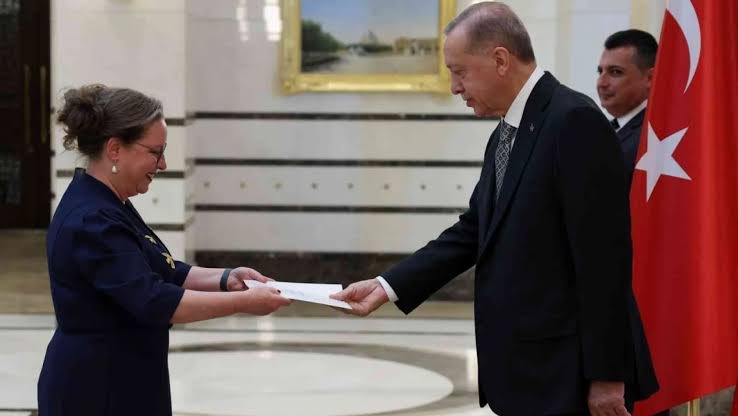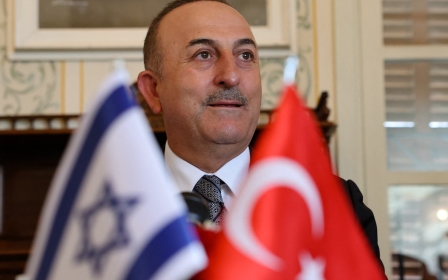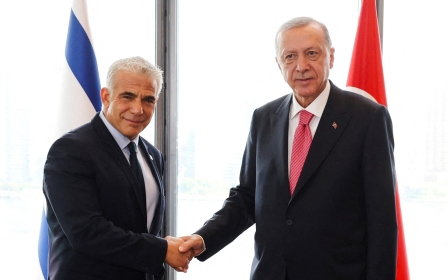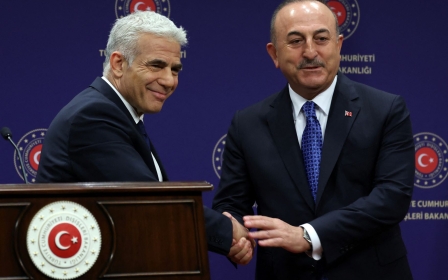Israel's new ambassador to Turkey confirmed after years of tensions

Israel's new ambassador to Ankara, in a "very emotional moment", presented her letter of credentials to Turkish President Recep Tayyip Erdogan on Tuesday, filling a post that's been unoccupied for more than four years.
In a tweet, Ambassador Irit Lillian said: "A very emotional moment this afternoon as I presented my letter of credentials to the President of the Republic of Türkiye.
"Looking forward to many more positive developments in the bilateral relations."
Lillian has been Israel's charge d'affaires in Ankara since February 2021 and played a role in the reconciliation process between the two sides.
New MEE newsletter: Jerusalem Dispatch
Sign up to get the latest insights and analysis on Israel-Palestine, alongside Turkey Unpacked and other MEE newsletters
'We all expect that the process of growing closer diplomatically between Israel and Turkey will become stronger'
- Irit Lillian, Israeli ambassador
This year, Turkey and Israel improved relations with high-level visits, including Israeli President Isaac Herzog's trip to Ankara in March, the first visit by an Israeli head of state to Turkey since 2008. They agreed to mutually appoint ambassadors in August.
In a video statement following her meeting with Erdogan, Lillian said: "We all expect that the process of growing closer diplomatically between Israel and Turkey will become stronger, will broaden and will spread over many areas of cooperation."
After Israeli prime minister-designate Benjamin Netanyahu won elections last month, he and Erdogan agreed to "work together to create a new era in relations".
Israel and Turkey were close regional allies for decades, with Turkey being the first Muslim-majority country to recognise the Israeli state in 1949.
Relations between the two sides nosedived following an Israeli raid on an aid flotilla to Gaza, which killed 10 Turkish citizens in 2010. Ankara subsequently expelled Israel's ambassador.
While diplomatic relations were restored in 2016, diplomatic contacts broke down again two years later. Turkey recalled its ambassador from Israel and expelled the Israeli envoy in response to its deadly crackdown on Palestinian protesters in Gaza during the Great March of Return protest movement.
Tensions remain
As relations have improved between the two countries, the number of Israeli tourists travelling to Turkey rose to an all-time high in the first nine months of this year, according to official statistics stretching back to the 1980s.
Nearly 632,000 Israelis arrived between January and September, a 448 percent increase compared to the previous year, when only 115,000 Israelis spent some time in the country.
Intelligence cooperation and a number of regional developments had served to bring the two countries closer.
However, there are still tensions between the two sides.
In November, Middle East Eye reported that Turkey's Foreign Minister Mevlut Cavusoglu had refused to comply with Israeli demands requesting the deportation of Hamas leaders living in the country during bilateral talks.
Responding to a question from MPs, Cavusoglu said Ankara did not view Hamas, the Palestinian resistance movement that rules the Gaza Strip, as a terror group and refused to expel them.
"We didn't satisfy any [Israeli] request on Hamas because we don't perceive Hamas as a terror group," Cavusoglu said. "We are always leading efforts to unify them with Fatah," he added, referring to Hamas' political rival, which dominates the Palestinian Authority (PA).
Earlier this month, Turkish intelligence and police detained 44 suspects who were believed to have been working for Israel's Mossad intelligence service to spy on Palestinians living in Turkey.
Turkish daily Sabah reported the suspects had been pretending to work as private consultants, but their real mission was to monitor Palestinians and Palestinian-operated groups and NGOs.
The report added that Mossad paid the individuals to spy on the Palestinian targets and hand personal information and data to Israeli handlers.
Middle East Eye delivers independent and unrivalled coverage and analysis of the Middle East, North Africa and beyond. To learn more about republishing this content and the associated fees, please fill out this form. More about MEE can be found here.




